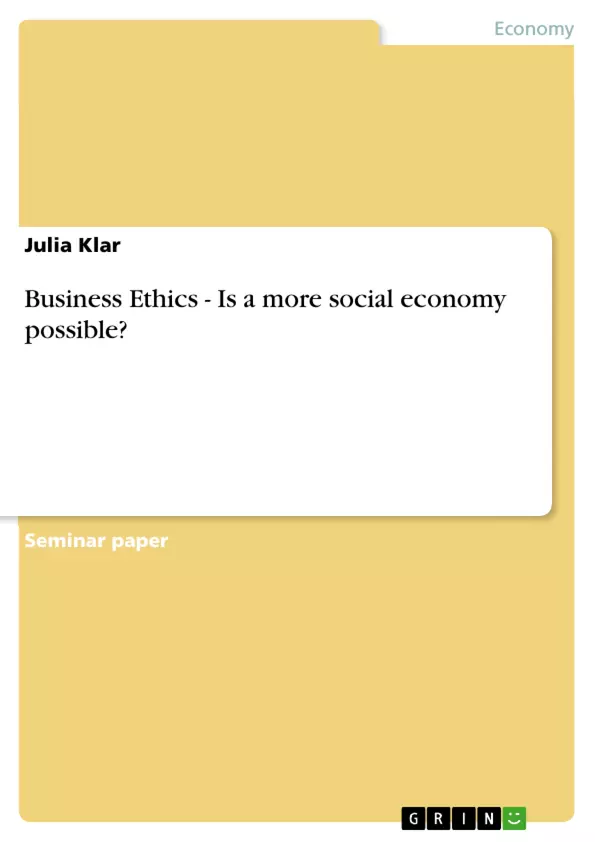Whether the economic system of capitalism will survive at its present form is uncertain. In the face of the increasing economic crisis, voices for an alternative system are getting louder. Especially a more ethical and more social economy is requested. However, is a more social economy possible?
Inhaltsverzeichnis (Table of Contents)
- Business Ethics
- The relationship between ethics and economy
- Ethical ways of doing business as marketing strategy
- Moral theories
- Utilitarian theory
- Consequentialist theory
- Deontological
- Social Responsibility
- Interdependency of stakeholders and shareholders
- Social entrepreneurship
Zielsetzung und Themenschwerpunkte (Objectives and Key Themes)
This paper examines whether a more social economy is possible. The focus is on the relationship between ethics and economy, and the importance of ethical ways of doing business for building a strong corporate reputation. The paper explores various moral theories and their applications to business ethics, ultimately focusing on the concepts of social responsibility and social entrepreneurship as potential solutions for a more social economic system. Key themes addressed in the paper include:- The role of ethics in business and the economy
- The importance of ethical ways of doing business as a marketing strategy
- The relationship between stakeholders and shareholders
- Social responsibility in international trade and global business
- Social entrepreneurship as a potential solution for a more social economy
Zusammenfassung der Kapitel (Chapter Summaries)
This chapter explores the relationship between ethics and economy, emphasizing the importance of ethical ways of doing business for building a strong corporate reputation. It argues that ethical behavior is essential for long-term business success, citing examples like the Fair Trade Foundation to demonstrate how consumer expectations can influence the market. The chapter also examines the relationship between corporate reputation and financial performance, highlighting the importance of maintaining a good reputation to ensure financial stability. This chapter delves into various moral theories, including utilitarian, consequentialist, and deontological, and discusses their applicability to business ethics. While these theories offer a theoretical framework, they are ultimately designed to guide decision-making in ethical dilemmas. The chapter serves as a brief introduction to ethical theory, emphasizing its importance in understanding the complex ethical issues faced in business. This chapter examines the concept of social responsibility within the context of international trade and global business. It questions the purpose of business, asking whether corporations should serve only their shareholders or also consider the needs of stakeholders. The chapter explores the interdependence of stakeholders and shareholders, emphasizing the impact of business decisions on all involved parties.Schlüsselwörter (Keywords)
This paper examines the potential for a more social economy, exploring the relationship between ethics, economy, and social responsibility. Key terms and concepts include: business ethics, corporate reputation, social responsibility, stakeholders, shareholders, social entrepreneurship, and ethical marketing. The paper emphasizes the importance of ethical decision-making in business, highlighting the need for a more socially responsible approach to global business practices.Frequently Asked Questions
Is a more social economy possible under capitalism?
This paper explores whether ethical and social alternatives can be integrated into the current economic system to address increasing crises.
What is the link between business ethics and marketing?
Ethical business practices are often used as a marketing strategy to build a strong corporate reputation, which in turn can lead to long-term financial success.
What is Social Entrepreneurship?
Social entrepreneurship refers to business models designed to solve social problems or provide community benefits while remaining economically viable.
What is the difference between stakeholders and shareholders?
Shareholders own stock in a company, while stakeholders include anyone affected by the business, such as employees, customers, and the local community.
Which moral theories apply to business ethics?
The paper discusses Utilitarianism (focus on consequences), Deontology (focus on duties), and Consequentialist theories as frameworks for ethical decision-making.
How does consumer expectation influence ethical business?
Examples like the Fair Trade Foundation show that when consumers demand ethical products, it forces markets and corporations to adopt more responsible practices.
- Citation du texte
- Master of Arts Julia Klar (Auteur), 2011, Business Ethics - Is a more social economy possible?, Munich, GRIN Verlag, https://www.grin.com/document/200163



